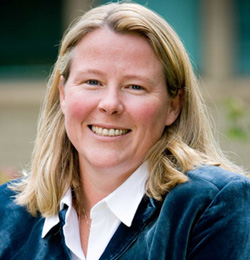
Kori Street
For USC Shoah Foundation’s education department, led by director Kori Street, PhD, being involved in the Auschwitz: The Past is Present program is a historic opportunity to demonstrate USC Shoah Foundation’s commitment to sharing and teaching survivors’ stories.
USC Shoah Foundation is partnering with Discovery Communications on the education component of Auschwitz: The Past is Present, a global communications and education program that will support the official observance of the 70th anniversary of the liberation of Auschwitz on January 27, 2015.
A major component of the education initiative of Auschwitz: The Past is Present will include new activities on the Institute’s free IWitness online educational platform, including four that go live in September. The IWitness site will also be accessible from DiscoveryEducation.com later in the fall.
There is also a contest for secondary teachers, with 25 being chosen to attend the commemorative events in Poland.
According to Street, Discovery Communications is an ideal partner for the educational component of the commemoration because it shares USC Shoah Foundation’s goal to engage students through digital media and teach them how to use it effectively and responsibly. The two organizations can also leverage each other’s strengths – Discovery’s extensive network of educators and USC Shoah Foundation’s high-quality content – to produce an inspiring program that will reach a large audience.
For the new IWitness activities, the goal was to provide a range of types of activities – including brand-new Mini Quests – that encourage students to consider both the historical facts and personal stories about Auschwitz. The teacher contest will allow educators to deepen their level of understanding and empathy about what happened at Auschwitz during the Holocaust, to inspire them to apply what they learn in Poland back at their own schools.
“An ideal candidate for this program would be someone who had thought reflectively what the Past is Present program means and had insight into how they could manifest that in an impactful way in their classroom,” Street said. “We want a teacher that’s curious, dynamic, interested in learning about digital media, testimony, history and memorialization and sees how this can change their classroom.”
Street said the new activities and teacher program are also meant to honor survivors and assure them that their stories will be taught for generations. It’s especially important this year because there may not ever be another official gathering of survivors at Auschwitz again. As the Auschwitz-Birkenau State Museum promises to preserve the Auschwitz site in perpetuity, USC Shoah Foundation will demonstrate that the survivors’ stories will also be preserved.
“It’s important for us to get involved in [Auschwitz: The Past is Present] in order to honor that moment and to reassure survivors we are carrying on their legacy. We will, with integrity, use their stories for education in perpetuity,” Street said. “We’re seeing all around the world that there are fewer and fewer survivors who can speak to students, so the testimonies in our archive will become that educational window into those stories.”
Street came to the Institute as its director of education in 2011 from Mount Royal University, where she was an Associate Professor and served as Chair of Entrepreneurship, Nonprofit Studies, International Business and Aviation in the Bissett School of Business. Her current work is focused on the preservation and educational use of Holocaust survivor testimonies. This focus has also resulted in work with national and international committees on Holocaust education, remembrance, and research as well as an examination of Holocaust imagery in the Harry Potter books and films. Continuing the focus on education, her other areas of research are problem-based learning and the integration of information literacy into the classroom.